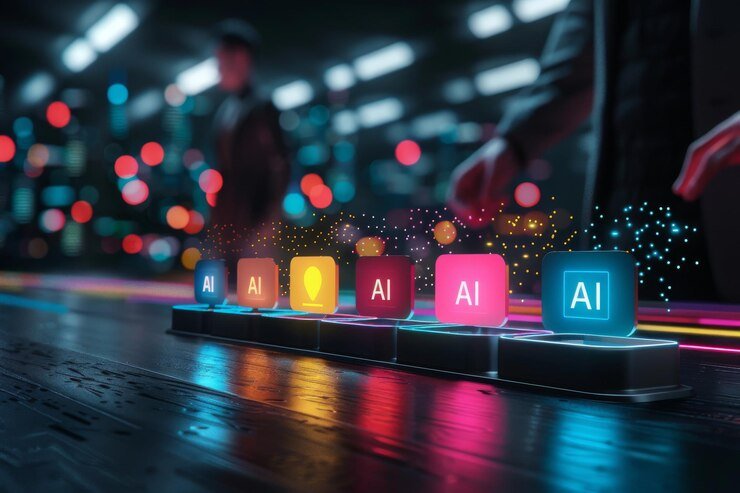Introduction
Artificial intelligence (AI) is redefining the advertising industry in today’s fast-paced digital advertising environment. Businesses may construct more efficient, successful, and tailored advertising campaigns by utilizing AI technology. This blog examines how artificial intelligence (AI) is changing the advertising industry and looks at its uses, advantages, drawbacks, and potential directions.
Understanding Artificial Intelligence
Artificial intelligence (AI) is defined as the emulation of human intellect in computers that have been designed with human-like thinking and learning processes. These robots are capable of doing tasks like language comprehension, pattern recognition, and decision-making that normally need human intellect by using algorithms and data.
Types of AI
Machine Learning: Within machine learning (ML) which is type of artificial intelligence, algorithms gain knowledge from data and gradually get better over time without the need for explicit programming. Ad targeting and predictive analytics are two applications for it.
Natural Language Processing: artificial intelligence technique known as natural language processing, or NLP, enables robots to comprehend, interpret, and produce human language. It drives language-based ad text and chatbots.
Computer vision: is the technology that enables machines to process and interpret visual data. It is applied to video analysis for advertising and picture identification.
Key Applications of AI in Advertising
Predictive Analytics: Using past data, AI-powered predictive analytics assists marketers in projecting future customer behavior. This enables firms to foresee trends, maximize advertising expenditure, and modify campaigns to satisfy changing consumer demands.
Personalization: AI analyzes user data and preferences to provide highly tailored ad experiences. Advertisements may be tailored to a person’s search history, purchasing habits, and previous encounters with a company, among other behaviors, increasing their relevancy and involvement.
AI improves programmatic advertising by automating the process of purchasing ads. Ad placements, bidding tactics, and targeting are optimized using real-time data to make sure the correct audience sees advertising at the right moment.
Chatbots and Virtual Assistants: Chatbots and virtual assistants driven by artificial intelligence offer immediate client service and interaction. By managing inquiries, making product recommendations, and assisting customers with the purchasing process, they may enhance the general customer experience.
Content Creation: Using preset criteria, AI technologies may produce photos, movies, and ad copy. In order to test various messages and designs and determine which creative is most effective, this involves producing versions of the advertisement content.
AI enhances ad targeting and audience segmentation: by breaking down audiences into groups according to their interests, behavior, and demographics. By presenting advertisements that appeal to particular audience segments, this exact targeting helps to increase conversion rates.
Benefits of AI in Modern Advertising
Enhanced Ad Efficiency: AI targets and automates ad campaign bidding and targeting, among other factors. Better campaign performance results from this efficiency, which also lowers human labor and increases the total effectiveness of advertising expenditure.
Improved Customer Insights: AI’s capacity to examine enormous volumes of data allows for a greater understanding of the preferences and behavior of customers. By gaining a deeper understanding of their audience, companies are able to make better decisions and design more effective strategies.
Cost reduction: AI eliminates wasted ad expenditure by automating operations and improving ad placements, hence reducing the need for considerable manual involvement. Better return on investment (ROI) for advertising efforts is the result of this cost effectiveness.
ROI increase: AI-driven customization and optimization increase engagement and conversion rates. Campaigns with enhanced targeting and pertinent ad content are more successful, maximize return on investment, and provide superior outcomes.
Improved Audience Segmentation: More accurate audience segmentation is made possible by AI’s sophisticated data processing capabilities. Companies may increase the possibility of contacting potential consumers and generating conversions by developing comprehensive audience profiles and delivering highly relevant adverts.
Challenges and Considerations
Data Security and Privacy: Data privacy and security are critical issues since AI is strongly dependent on data. To preserve trust and stay out of trouble with the law, advertisers need to make sure that privacy laws are followed and user data is protected.
Ethical Implications: The application of AI in advertising brings up moral questions about things like algorithmic bias and data usage transparency. Businesses must take these issues seriously and make sure their AI procedures are just and moral.
Complexity and Integration: It might be difficult to integrate Artificial Intelligence techniques with current advertising platforms. To achieve seamless integration and functioning, businesses must make sure that their AI solutions are in line with their present technology stack and operations.
Dependency on Data Quality: The quality of the data that artificial intelligence processes has a significant impact on its efficacy. Incomplete or inaccurate data might result in poor decision-making and subpar AI performance. To ensure that AI-driven advertising is successful, high-quality data must be ensured.
Future Trends in AI Advertising
Emerging Technologies: Artificial Intelligence is always changing, and new innovations like quantum computing and sophisticated neural networks are just around the corner. These developments should improve artificial intelligence’s advertising capacities even further.
Future AI Developments: It is anticipated that advances in this field will lead to even more precise ad targeting, improved customization, and real-time optimization. In order to take advantage of new possibilities and preserve a competitive edge, businesses need remain up to date on these innovations.
Future-Ready: To stay competitive, companies should make investments in AI R&D, investigate new AI tools and platforms, and continuously modify their advertising campaigns to take advantage of the most recent advancements in AI.
Tools and Platforms for AI Advertising
Synopsis of Well-Known Artificial Intelligence Tools: Google AI, Adobe Sensei, and IBM Watson are some of the best AI tools for advertising. These platforms provide a number of capabilities for audience analysis, content production, and ad optimization.
Comparing aspects: Machine learning models, natural language processing, and data analysis tools are just a few of the distinctive aspects that each Artificial Intelligence tool offers. Businesses may choose the best advertising tools for their purposes by comparing these aspects.
Choosing the Right Tool: Cost, scalability, simplicity of integration, and functionality are all important considerations for firms when choosing an AI tool. Selecting the appropriate instrument guarantees AI’s ability to improve advertising campaigns and get the intended results.
Conclusion
With its cutting-edge customization, targeting, and efficiency capabilities, artificial intelligence is revolutionizing modern advertising. Businesses may maintain their competitiveness, increase return on investment, and provide audiences with more relevant ads by incorporating AI into their advertising campaigns. Brands may maximize their advertising efforts and succeed more in the digital sphere by comprehending and using the function of AI.
Know more about us and Contact us for our services and more.
Check out our another blogs:
1.The Importance of Mobile Optimization in 2024: Is Your Website Ready?
2.5 Powerful Ways Voice Search is Revolutionizing Your SEO Strategy
3.SEO vs. SEM: 5 Powerful Reasons to Choose the Best Strategy for Your Business
Image Credits: Freepik






